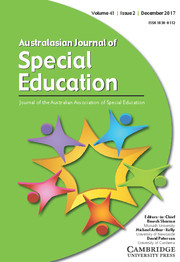Article contents
Trends and Influences in the Integration of Students with Disabilities in Australia
Published online by Cambridge University Press: 26 February 2016
Abstract
Although support for the integration of students with disabilities has increased in the past 20 years in Australia, it has not been clear to what extent this support has resulted in less restrictive educational placements for these students. This paper reports the results of an analysis of trends in the placement of students with disabilities in Australian schools. The paper also discusses the influence on this educational placement by sex, age and number of disabilities of school students, and their State of residence. This discussion follows the analysis of portions of a national data set compiled by the Australian Bureau of Statistics that related to people with disabilities.
- Type
- Research Article
- Information
- Copyright
- Copyright © The Australian Association of Special Education 1995
References
- 1
- Cited by


